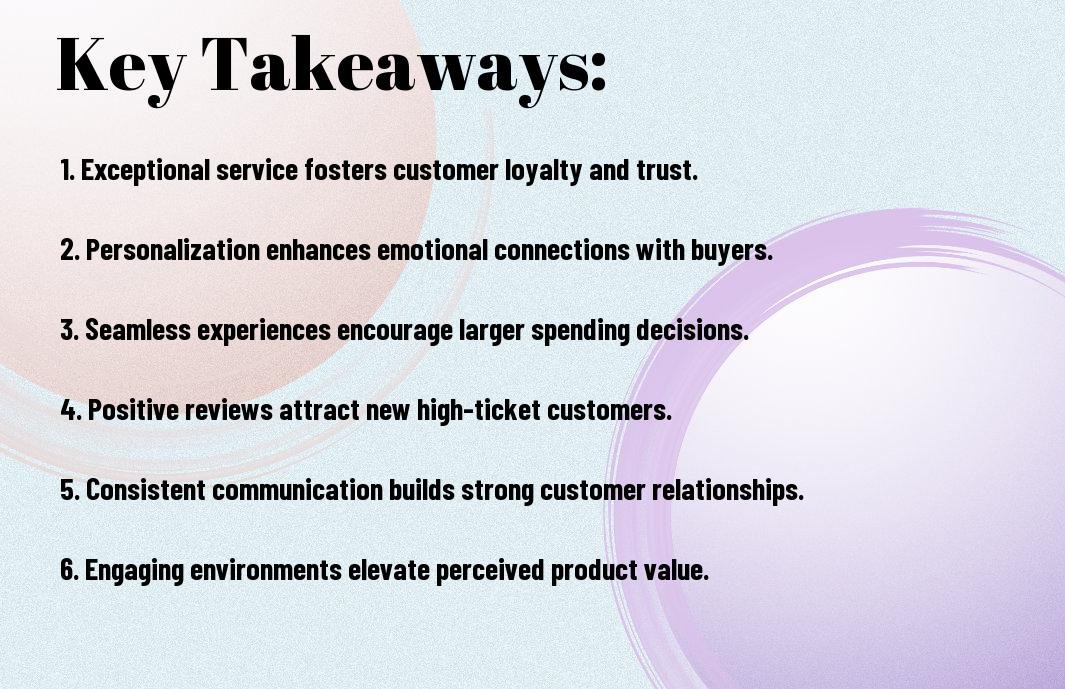Most successful businesses understand that selling premium products or services requires more than just compelling features and benefits. When you’re dealing with high-ticket items, your customers expect an exceptional journey from initial contact through post-purchase support. Your ability to create meaningful interactions, build trust, and deliver personalized attention directly influences purchasing decisions in the premium market segment. As buyers invest significant resources in your offerings, their experience becomes a defining factor that can make or break the sale, ultimately impacting your bottom line and brand reputation.
The Psychology of High-Ticket Purchases
While making high-ticket purchases, your brain processes information differently than during routine buying decisions. When you’re considering a premium product or service, your decision-making involves both rational and emotional components, with studies showing that emotional responses account for up to 95% of purchasing decisions. You evaluate not just the product itself, but the entire experience surrounding the purchase, from initial research to post-sale support.
Emotional Drivers in Premium Decisions
After analyzing your motivations for high-ticket purchases, you’ll notice that status, exclusivity, and personal achievement play significant roles. Research indicates that 80% of luxury buyers cite emotional satisfaction as a key factor in their purchasing decisions. You’re not just buying a product; you’re investing in how it makes you feel and what it says about your success and lifestyle choices.
Quick recommendation: Our blog is filled with useful tips to help you succeed. If you are seeking a more comprehensive training program, we recommend the 72 Hour Challenge.
Trust-Building Elements
Against the backdrop of significant financial commitment, your trust in the brand becomes a fundamental factor. You need consistent reassurance through social proof, expert endorsements, and transparent communication. Studies show that 92% of consumers read online reviews before making high-ticket purchases, and 88% trust these reviews as much as personal recommendations.
Psychology reveals that your confidence in making high-value purchases increases significantly when you encounter multiple trust signals throughout your buying journey. From detailed product information and authentic customer testimonials to professional certifications and secure payment indicators, each element contributes to your overall sense of security and validation in the purchasing decision.

Customer Journey Touchpoints
Any successful high-ticket sales strategy requires a deep understanding of your customer journey touchpoints. These points of interaction between your brand and potential buyers shape their perception, trust, and ultimately, their purchasing decisions. Research shows that companies focusing on customer experience see a 4-8% higher revenue compared to their competitors in the same market.
Pre-Purchase Engagement
Before your prospects make significant purchasing decisions, they engage with your brand through multiple channels. Your website, social media presence, content marketing, and initial consultations create the foundation for trust and credibility. Studies indicate that 76% of high-ticket buyers conduct extensive research across at least three different channels before making direct contact with your sales team.
Point of Sale Experience
The actual sales interaction represents a critical moment in your customer’s journey. Your ability to demonstrate value, address concerns, and provide personalized solutions directly influences conversion rates. Data shows that businesses offering personalized high-ticket sales experiences see a 40% higher average order value compared to those using standardized approaches.
Engagement during the point of sale needs to be seamless, professional, and value-focused. Your sales team should be equipped with detailed product knowledge, understanding of your customer’s specific needs, and the ability to communicate complex features in relatable terms. When you implement a consultative selling approach, your conversion rates can increase by up to 20% for high-ticket items.
Digital Experience Integration
Once again, your ability to seamlessly integrate digital touchpoints into the customer journey has become a defining factor in high-ticket sales success. Research shows that 73% of customers use multiple channels during their buying journey, and when purchasing premium products or services, this number increases to 85%. By creating a cohesive digital ecosystem, you can guide your prospects through a sophisticated buying experience that builds trust and justifies higher price points.
Quick recommendation: Our blog is filled with useful tips to help you succeed. If you are seeking a more comprehensive training program, we recommend the 72 Hour Challenge.
Omnichannel Presence
Digital consistency across all platforms has emerged as a cornerstone of successful high-ticket sales strategies. Your customers expect a unified experience whether they’re browsing your website, engaging with your mobile app, or interacting through social media channels. Studies indicate that companies with strong omnichannel customer engagement retain on average 89% of their customers, compared to 33% for companies with weak omnichannel engagement.
Personalization Strategies
An effective personalization strategy can increase your high-ticket sales conversion rates by up to 20%. By leveraging customer data and behavioral analytics, you can create tailored experiences that resonate with your high-value prospects. Your ability to anticipate needs and provide relevant solutions at each stage of the customer journey can significantly impact purchase decisions for premium products and services.
Experience shows that implementing advanced personalization techniques, such as AI-driven product recommendations and customized content delivery, can lead to a 40% increase in average order value for high-ticket items. When you align your digital touchpoints with individual customer preferences and behaviors, you create a more compelling case for investment in your premium offerings.

Premium Service Elements
Now, when dealing with high-ticket sales, your premium service elements serve as key differentiators that justify higher price points and build lasting customer relationships. Research shows that 86% of buyers are willing to pay more for a superior customer experience, making these premium touchpoints necessary in your high-value sales strategy. Your ability to deliver exceptional service elements can transform one-time buyers into loyal advocates who generate substantial lifetime value.
White-Glove Approach
Service excellence in high-ticket sales demands a white-glove approach that anticipates and exceeds your customers’ expectations at every interaction. Your dedicated account managers, personalized consultation sessions, and round-the-clock support create an environment where clients feel valued and understood. Studies indicate that 73% of customers point to experience as an important factor in their purchasing decisions, making your white-glove service approach a powerful tool for closing premium sales.
Exclusive Access Programs
Above standard service levels, your exclusive access programs create a sense of privilege and belonging that resonates strongly with high-ticket buyers. By offering priority scheduling, VIP events, and early access to new products or services, you can establish a compelling value proposition that justifies premium pricing. Data shows that customers enrolled in exclusive programs spend on average 67% more than non-members.
Programs designed with tiered benefits, personalized rewards, and unique experiences help you create a sophisticated ecosystem that nurtures long-term relationships with your high-value clients. Your ability to provide these exclusive touchpoints not only enhances customer satisfaction but also creates powerful word-of-mouth marketing opportunities among affluent customer segments.
Building Long-Term Relationships
Not all high-ticket sales follow the same path, but building lasting relationships remains a cornerstone of sustained business success. Your ability to nurture these connections can transform one-time buyers into lifetime advocates, with research showing that increasing customer retention by just 5% can boost profits by 25-95%. When you invest in relationship building, you create a foundation of trust that extends beyond the initial transaction.
Post-Purchase Communication
An effective post-purchase communication strategy helps you maintain engagement and demonstrate ongoing value to your customers. Your follow-up messages, whether through personalized emails, phone calls, or dedicated account management, show that you’re invested in their success beyond the sale. Studies indicate that 80% of your future profits will come from just 20% of your existing customers, making consistent communication imperative.
Loyalty Development
Between 60-70% of satisfied customers will make repeat purchases if you maintain strong relationships with them. Your loyalty programs, exclusive access to new products, and personalized experiences create a sense of belonging that encourages continued engagement with your brand. When you focus on developing customer loyalty, you’re not just securing future sales – you’re creating brand advocates who will recommend your products to others.
Hence, your investment in loyalty development should encompass multiple touchpoints throughout the customer journey. You can implement VIP programs, early access to new products, and specialized support services that make your high-ticket customers feel valued and appreciated. Data shows that loyal customers spend 67% more than new ones, making this approach particularly valuable for high-ticket sales strategies.
Measuring Experience Impact
Many organizations struggle to accurately measure the impact of customer experience on their high-ticket sales. Your ability to track and analyze customer experience metrics can make the difference between sustained growth and stagnation. Research shows that companies with superior customer experience generate 5.7 times more revenue than their competitors who lag in customer experience.
Key Performance Indicators
Beside traditional sales metrics, you need to focus on specific customer experience KPIs to understand your high-ticket sales performance. These include Net Promoter Score (NPS), Customer Effort Score (CES), and Customer Satisfaction (CSAT) ratings. Your NPS can help predict customer loyalty and repeat purchases, while CES indicates how easily customers can complete transactions with your business.
Return on Experience Investment
Among the most valuable metrics for high-ticket sales is Return on Experience Investment (ROX). This measurement helps you understand how your investments in customer experience translate into tangible business results. Studies indicate that companies with strong ROX achieve 1.6 times higher customer satisfaction rates and see 1.9 times better revenue growth.
Investment in customer experience initiatives requires careful tracking and analysis to justify continued spending. Your ROX calculations should include both quantitative metrics like conversion rates and average order value, as well as qualitative data such as customer feedback and testimonials. By monitoring these indicators, you can optimize your experience strategy to maximize returns on high-ticket sales.
Final Words
Hence, your ability to deliver exceptional customer experiences throughout the high-ticket sales journey can make the difference between securing premium sales and losing potential buyers. When you focus on creating personalized touchpoints, maintaining transparent communication, and providing value-driven interactions, you establish the trust necessary for customers to commit to significant purchases. Your investment in customer experience directly correlates with increased conversion rates, higher customer lifetime value, and a stronger brand reputation in the luxury market.
By implementing a customer-centric approach in your high-ticket sales strategy, you position your business to thrive in an increasingly competitive marketplace. Your attention to detail in every customer interaction, from the initial contact to post-purchase support, creates a compelling narrative that justifies premium pricing and builds long-term customer loyalty. As you continue to refine and enhance your customer experience framework, you’ll find that satisfied clients become your most effective brand advocates, naturally driving more high-value sales through positive word-of-mouth and referrals.
Quick recommendation: Our blog is filled with useful tips to help you succeed. If you are seeking a more comprehensive training program, we recommend the 72 Hour Challenge.

